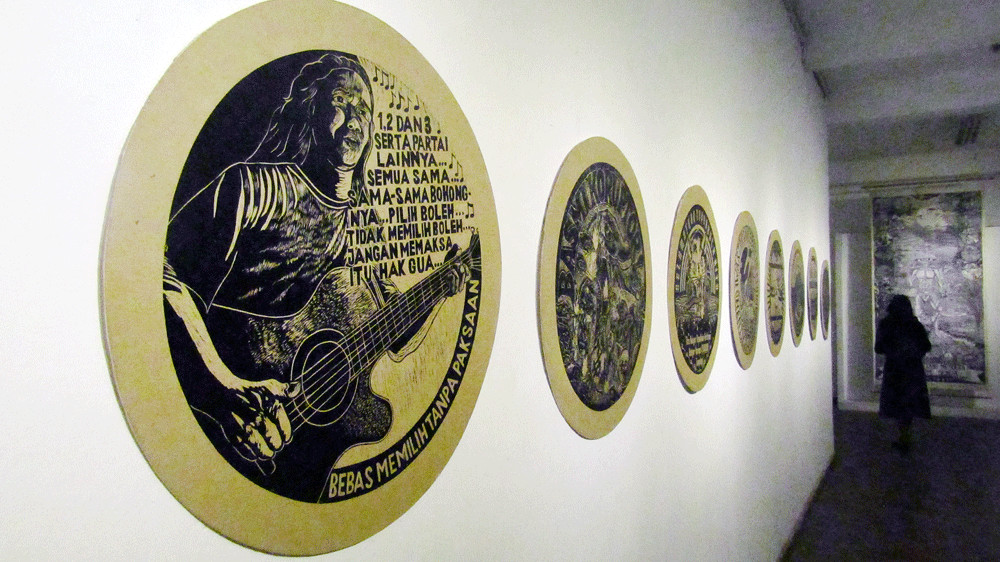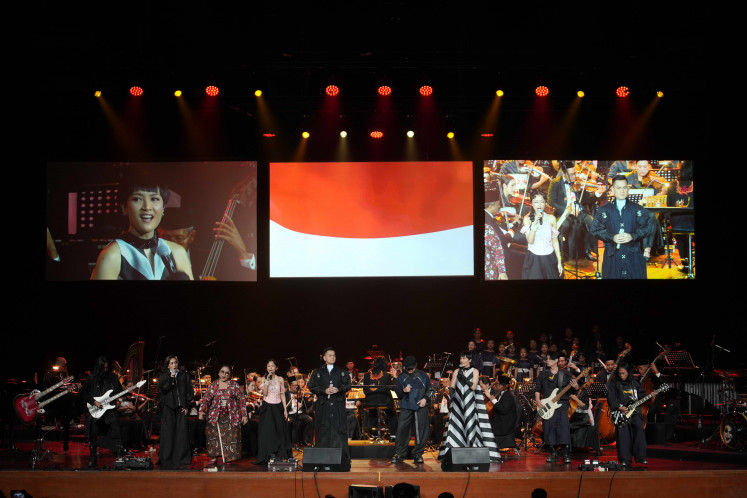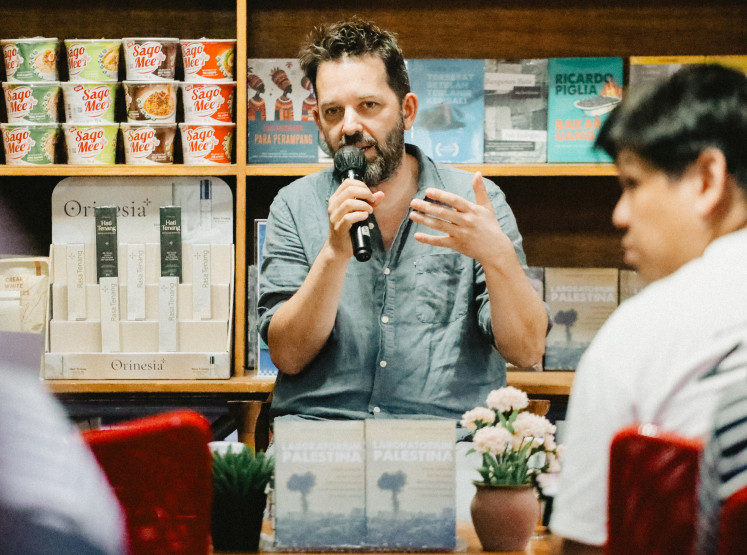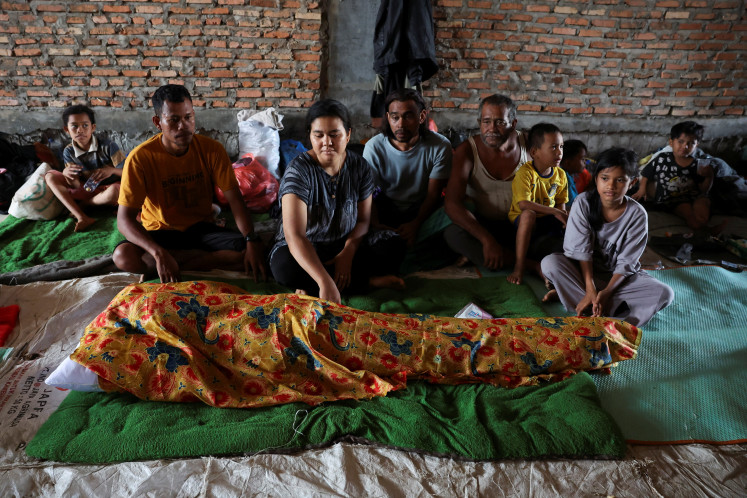Popular Reads
Top Results
Can't find what you're looking for?
View all search resultsPopular Reads
Top Results
Can't find what you're looking for?
View all search resultsTaring Padi marks 20 years of fight through art for all
In Indonesia’s art scene, Taring Padi is known as a group of artists who reject the notion of art for art’s sake, preferring to utilize art to fight for people’s interests.
Change text size
Gift Premium Articles
to Anyone
S
everal members of the Yogyakarta art community, Taring Padi, unveiled a mural on the second-floor wall of the R.J. Katamsi Gallery at the Indonesian Arts Institute (ISI) as part of the group’s “Bara Lapar Jadikan Palu” (Let Hunger be a Hammer) exhibition.
The community band, Dendang Kampungan, sang “Mentari” (Sun) on the ground floor, in memory of Taring Padi founder member, Yustoni Volunteero, who passed away in June this year.
The event also marked a reunion for some members and those close to the community, including history and photography lecturer from Edinburgh Napier University in Scotland, Alexander Supartono, who came to the event.
The exhibition, with Bambang “Toko” and Ucup as curators, was recently held to mark the 20th anniversary of Taring Padi’s founding on Dec. 21, 1998, in Yogyakarta.
In Indonesia’s art scene, Taring Padi is known as a group of artists who reject the notion of art for art’s sake, preferring to utilize art to fight for people’s interests.
Ucup explained that taring padi meant the fur on rice grains. “When it’s blown by the wind and affects the skin, it will make one itch, meaning the community’s works, however small, can cause an itch among those it criticizes,” he said.
Taring Padi has often had this “itchy” effect on those in power. It was once even attacked by an unidentified gang on the former ISI campus, during which some works being exhibited were stolen or damaged.
ISI rector Agus Burhan described Taring Padi as strongly upholding the ideology of populism. “Populist visual art is a strong indicator in modern fine art that opposes the art of romanticism,” he said in the event’s opening speech.
Among the themes presented in Taring Padi’s exhibits were resistance to militarism, opposition to former president Soeharto and his New Order regime, the defense of farmers’ and workers’ rights, environmental protection, tolerance, corruption eradication, human rights protection and democracy.
Historically, Taring Padi is reminiscent of the Sanggar Bumi Tarung (Fighting Arena) artist group and the People’s Cultural Institute (Lekra) of the 1960s, leading many to assume this community is an affiliate to the leftist Democratic People’s Party (PRD), while in fact it is an independent group.
Hundreds of art objects — such as protest banners, posters, postcards, pins, calendars, stickers, patches, comics, 3-D works and paintings — were on display at the exhibition.
A giant realist painting entitled People’s Justice, depicting the people’s victory over oppressors, was hung from the second floor to the ground floor.
Large paintings, mostly from the community’s early days, were displayed on the ground floor, alongside realist installations such as Berdiri di Atas Kekuatan Pangan Sendiri (Food Self-Reliance), Pengungsi #2 (Refugees) andMengadili Suharto dan Para Jenderal (Trying Soeharto and the Generals).
The second floor displayed smaller works, with the exception of a large painted banner for the advocacy of Lapindo mudflow disaster victims in Sidoarjo, East Java, and 22 round posters, Terompet Rakyat (People’s Trumpet), in the woodcutting fashion in response to the 2019 elections.
Visitors examining the collective art pieces were helped to understand the context of the works with documented photographs attached next to the exhibits. The pictures recorded Taring Padi’s work while they were used as a means of resistance to the authorities.
In the exhibition rooms, visitors felt as if stepping into an Indonesian sociopolitical history book, portraying the times from the fall of Soeharto’s New Order up to the present. The art objects served as a symbol of popular opposition that made the established order “itch”.
Curator Lisa Horikawa of the National Gallery Singapore, who specially visited the show, said she felt fortunate to be able to see Taring Padi’s art pieces, and was impressed by the mural-making process at the gallery. “It is a very organic process, there is no fixed pattern,” she said.
Alaxander had a different impression, noticing a quality decline in Taring Padi’s artworks, which were no longer created by fine-art students.
He attributed the decline to the organizational change from a strict and exclusive group to an inclusive one since 2003 in line with the principle of art for ordinary people. It is now open to anybody interested in working out collective creations.
There is also a visual change, in which icons like boars or wolves, representing the oppressive economic and political elite, no longer appear.
Ervan Dwi Putra, a young artist who joined the community in 2018, acknowledged his pop-trending paintings. “Only a few of my pieces bear political messages,” he said.
Taring Padi activist Fitri DK said the organizational change had also caused the group’s activism to decline. Since 2003, many of its activists have moved to other regions and are raising families.
The decline may explain why serious current issues, such as the new airfield construction in Kulon Progo that has seen thousands of farmers evicted, for instance, is absent from the community’s art records.
But when asked whether the decline was a sign of the community’s demise, Alexander disagreed. “They still celebrate their anniversary and Taring Padi members continue to develop their new visions in different new places, forming the strength of Taring Padi,” he said.











